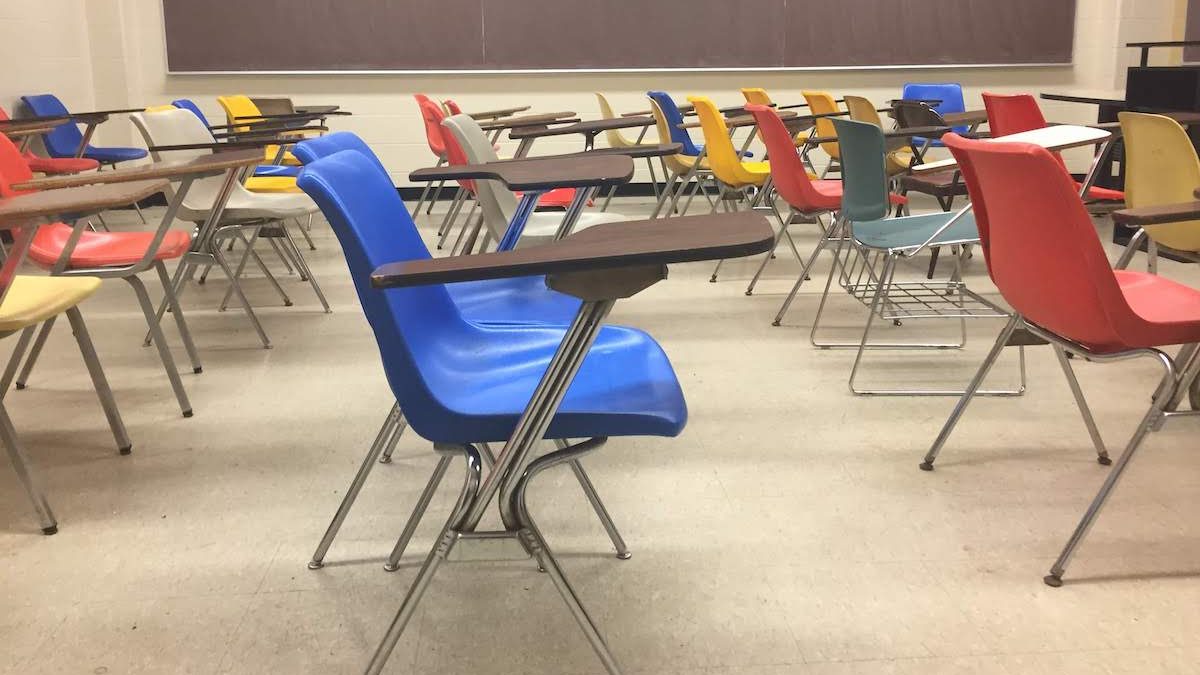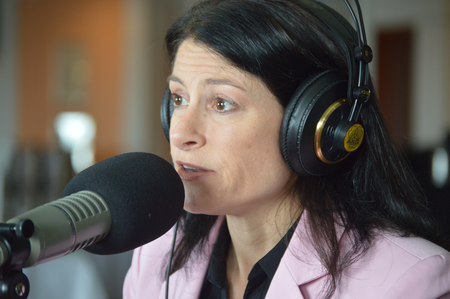AG Nessel Applauds ‘Right to Read’ Ruling Against State
A federal appeals court ruled Detroit students can sue the state for a quality education. Michigan State Attorney General Dana Nessel, whose office represented the state, says this is a victory for civil rights.

Photo Credit: Laura Herberg, WDET
The Sixth Circuit court of Appeals ruled last week that a lawsuit filed by Detroit Public Schools students in 2016 against the State of Michigan can proceed.
The students say while the state controlled city schools, buildings deteriorated and classes suffered from a lack of materials and a shortage of qualified teachers. Conditions so bad – they say – the students could not learn.
“We know that a good education leads to all different kinds of opportunities. It means that there’ll be less crime and less poverty. It’s a win-win-win.”

State Attorney General Dana Nessel has supported the suit – which argues public school students have a constitutional right to a basic level of education, sometimes referred to as a “right to read.”
“My parents were the children of very poor immigrants that couldn’t read English and had no education at all,” Nessel says. “But they were born in the city of Detroit, and despite being very poor they received an excellent public school education and they were able to go on and succeed as a result.”
She says that the conditions of public education in Detroit dramatically deteriorated over decades — and specifically when a state emergency manager took over the school system.
“The complaint that were made by the plaintiffs in this case were really upsetting,” Nessel says. “The lack of resources they had, whether it be teachers, or books, or the conditions in the classroom. Or the fact that their schools were fundamentally unsafe.”
Click on the player above to hear State Attorney General Dana Nessel on the impact of the ruling, and read a transcript, edited for length and clarity, below.
Sascha Raiyn, 101.9 WDET: Can you explain the wall you created so that you, as the Attorney General, could weigh in with your opinion in support of the plaintiffs. And your staff could represent the defense, which was the State of Michigan?
Dana Nessel, Michigan Attorney General: My office, it is their job to represent the governor and to represent the Board of Education and the state Superintendent. And they did a magnificent job with it, and I think they did the best job that they could under the circumstances.
But I felt that it’s important, in my parens patriae capacity as Attorney General, which is basically, it’s not just that as Attorney General that it’s my job to defend state agencies and defend state actors, it’s also my job to defend the people of this state. And that includes these schoolchildren from the city of Detroit.
So I erected a conflict wall, I filed an amicus brief on behalf of the plaintiffs. Now unfortunately, the Sixth Circuit ultimately did not accept my filing. I think they somewhat misunderstood the conflict wall. We build conflict walls, by the way, all the time. We have individuals from my office that argue one side, and another side that makes an argument on my personal behalf in my capacity as Attorney General. We do this regularly.
Nevertheless, the public court declined to officially accept the pleadings, but they adopted our arguments. They found, for the first time ever, an appellate court in this nation has made a finding that their is a fundamental right for school children to receive a minimal standard of education.
If the courts do rule that there is a basic right to education, what would be changed?
Well, that’s going to be interesting, Because in the event this ruling stands, it goes back to the district court, where there has to be findings of fact that are made as to whether or not this newly created constitutional right was actually violated by these defendants during the course of time and against these plaintiffs. It would really be setting a new legal precedent as to what those findings were and what constitutes a violation of their rights.
What the opinion says is, and this is at the very, very end, “the ultimate solutions must come from the lawmakers and from the democratic pressures of those who elect them.”
And what that means to me is that, simply, we have to have higher standards imposed on the school system in terms of what they provide for the students to provide them with these minimum standards of a literacy education and how much money we put into our public school districts all around the state.
This doesn’t just apply to the city of Detroit, this applies to the entire state — and really to four states now, because it’s in the Sixth Circuit. Michigan, Ohio, Kentucky and Tennessee.
We know that a good education leads to all different kinds of opportunities, and whether that has to do with participation in the democratic process, or of course, job opportunities. It means that there’ll be less crime and less poverty, I mean, it’s a win-win-win. And I really hope that people will see it that way.
This ruling was made at a time when schools in Michigan and across the country are closed as a precaution against the spread of coronavirus. Is there a danger that this suit could open government up to liability in a variety of situations where states and districts can’t or don’t meet educational benchmarks?
Obviously, we have a number of lawsuits that have been filed against the state based on the governor’s emergency orders, her executive orders. I think it’s important that people understand that the calculus for a violation of constitutional rights changes dramatically during public health crisis. And, as has been noted many times by the courts, the Bill of Rights is not a suicide pact.
You know, there are certain circumstances where exceptions have to be made. And I think a global pandemic certainly is one of them. So, I would suggest that during the course of a crisis of this nature, that exceptions would be made, and it wouldn’t be deemed because public schools were essentially canceled for a large part of the year that somehow that is a constitutional violation.
This case has bounced between courts long enough for the named defense to have changed from Republican Governor Snyder to Democrat Governor Whitmer. How does politics affect how the state responds in this case and to the situation?
I feel very confident that had Gov. Whitmer been the governor of this state during the course of all of these years, that we’re talking about that these situations occurred, we never would have been in this situation in the first place. Because I don’t believe she would have put an emergency manager in place. And the schools wouldn’t have been driven into the ground the way that we saw occur. And we would have had a governor that cared much more deeply about public school education in general, and specifically public school education for communities of color. So, none of this would have happened under a Gov. Whitmer. She is the name defendant now only because she’s the current governor, even though this doesn’t apply to us. We no longer have an emergency manager that is running Detroit Public School System.
If you looked at the governor’s budget, which was never approved for 2020, and likely what we would see in any such budget for 2021, there would be a greater emphasis on educational resources and funding. The problem comes into play when you have Republicans that are in the legislature that are not in agreement with that and don’t want to prioritize it in the same fashion.
The problem that’s going to be faced now, of course, is that in the event that you underfund public schools, and you don’t prioritize them correctly, ultimately the state is going to end up being liable for violations of the constitutional rights of their students. So now it creates a different kind of impetus to properly fund the schools again.
We have to get past this crisis that we’re in right now because of these projections of a $7 billion shortfall over the course of the next 18 months. So clearly, we’re not going to be in a good place to fund anything in this state, let alone to reprioritize how we evaluate funding for public schools.
Is this a significant lawsuit even if it is lost?
I think so. You know, often times when it comes to civil rights cases, and I don’t want to speak on behalf of the plaintiffs that brought this lawsuit, but sometimes you have to put these issues out there. And you have to put them out into a court of law and they have to be tested. And they have to be tried for the public to be better educated on them. And sometimes it takes several goes at it, you know, you have to try it numerous times before people come to really understand it. And a lot of times, it’s the data that has to be developed to better understand it.
I came up handling LGBTQ related cases, but I lost a whole lot of cases before I started winning them. And then what would happen sometimes — this happened in the DeBoer case, which later turned into the Obergefell case at the United States Supreme Court — is that some of my losing cases were actually cited in winning majority opinions later on. So, they were building blocks essentially towards gaining a better understanding of what was needed to create a fundamental right and why that fundamental right ought to exist.
Trusted, accurate, up-to-date
WDET is here to keep you informed on essential information, news and resources related to COVID-19.
This is a stressful, insecure time for many. So it’s more important than ever for you, our listeners and readers, who are able to donate to keep supporting WDET’s mission. Please make a gift today.
